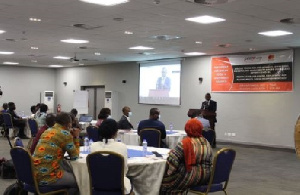 Some participants at the Utafiti Sera Convening in Ghana workshop
Some participants at the Utafiti Sera Convening in Ghana workshop
• Research says Ghana’s youth unemployment is at 12.1 percent
• PAGSR is working on a research to find alternate ways of understanding youth aspirations and adaptability
• Government believes vocational training is a sure way to better the unemployment rate
A Deputy Minister of Education, Gifty Twum Ampofo, has reiterated the need for the country to be re-positioned with regards to training its youth in vocational courses, adding that it is the way of the future.
She explained that the age-long misconception about vocational training should change.
“Much investment has earlier on been done, and still being done in the areas of skills acquisition, that is what we say is TVET and now, wherever you go, wherever you are, you hear somebody talking about TVET.
“With TVET, we’ve had a misconception for many years: ‘let the bright students go for the grammar education and let the daft ones – those who can’t put their acts together, go for TVET’, and by so doing, the bright students don’t want to get into TVET and so they go through the grammar education and at the end of the day, they’ll be looking for jobs,” she said.
Gifty Twum Ampofo was speaking at Ghana Utafiti Sera Inception Convening program launch in Accra on the theme, “African young men and women’s aspirations, resilience and adaptability before, during and beyond COVID-19: Prospects for livelihoods, employment and accountability – Ghana Inception.”
The program, by Partnership for African Social and Governance Research (PASGR), with support from the Mastercard Foundation, is a coordination of a multi country research project on youth aspirations, resilience and adaptation in seven sub-Saharan countries.
The countries are Ethiopia, Kenya, Nigeria, Rwanda, Senegal, Uganda, and Ghana as its starting point.
The Ghana Labour Force report estimate the youth unemployment rate at approximately 12,1 percent. In addition, around 40 percent of Ghanaian youth have no form of formal education, with less than 5 percent having acquired a tertiary education qualification as indicated in the 2015 Labour Force Report (GSS, 2016).
According to Dr. Anthony Mveyange, PASGR Executive Director, this project “is intended to understand the implications of the crisis for the lives of African youth now and in the future.”
He explained that in order to tackle the issue of development, through the youth, in Africa, there is the need to redefine job creation for these groups of people.
“We no longer just do research for knowledge, but we do research that responds to the unique needs of the people,” Dr. Martin Atela, PASGR Research and Policy, said.
The Utafiti Sera Convening in Ghana, as it is called, aimed at bringing together a wide range of key stakeholders including development professionals, policy makers, youth serving organizations, NGOs, Civil Society Organizations, youth associations, and young people themselves among others.
The workshop also established the Utafiti Sera House on Youth Aspirations to anchor the research work in Ghana.
Currently engaged in more than 16 African countries, PAGSR works to enhance research excellence in governance and public policy that contributes to the overall wellbeing of the population, focusing on the production and dissemination of policy relevant research.